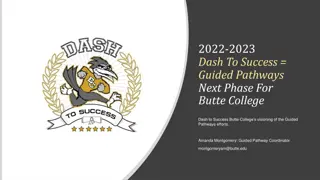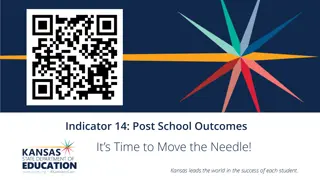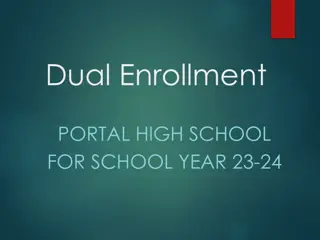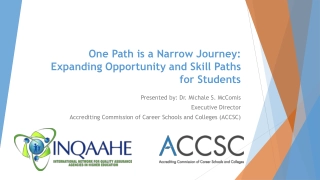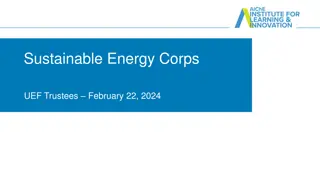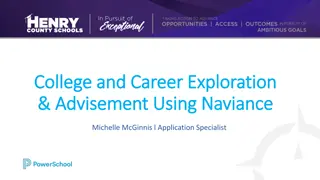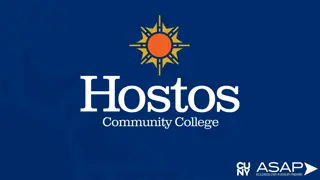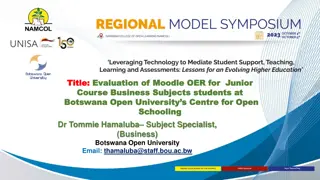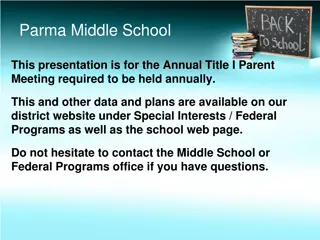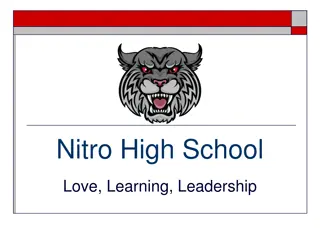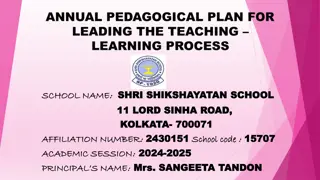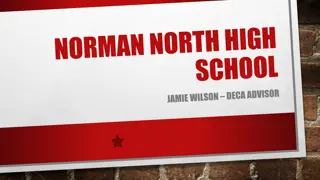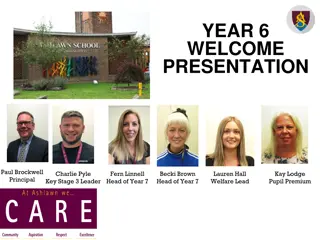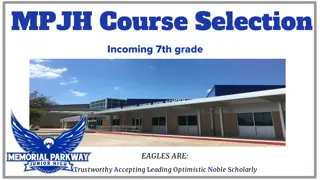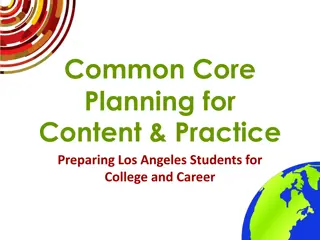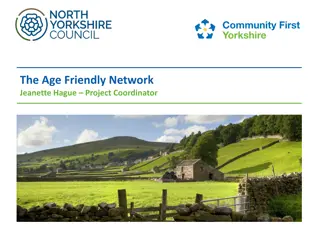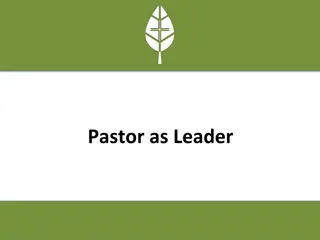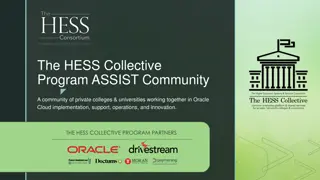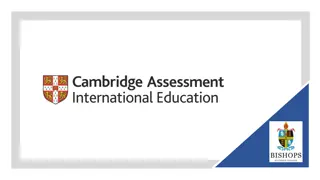Empowering Students at John Chilton School for Future Success
John Chilton School aims to equip students with essential life skills, promote mental health awareness, and encourage independence. The curriculum focuses on personalized plans, interventions, and three pathways tailored to individual student needs. Through engagement, sensory exploration, and practical activities, students develop skills for adult life, communication, and healthy lifestyles.
Download Presentation
Please find below an Image/Link to download the presentation.
The content on the website is provided AS IS for your information and personal use only. It may not be sold, licensed, or shared on other websites without obtaining consent from the author. Download presentation by click this link. If you encounter any issues during the download, it is possible that the publisher has removed the file from their server.
Presentation Transcript
John Chilton School John Chilton School 2022 2022- -2023 2023
leave the school with the skills, abilities, potential and confidence to meet the challenge of adult life in a fast changing world, including where to get help; increase their awareness of mental health and emotional wellbeing, to be in control of their lives and be able to self-regulate; gain independence skills including, travel, community use and cooking skills wherever possible; understand their disability, cope with the emotional stresses often associated with disability and be empowered with the skills, knowledge and attitude to take responsibility for managing their needs into adult life; develop lively, enquiring minds and have the opportunity to achieve nationally recognised qualifications; communicate effectively and confidently with a range of people in a variety of contexts, including carers; use the internet safely and with purpose; develop positive attitudes towards healthy lifestyles and diverse communities, promoting activity, creativity and competition through sport and leisure; develop an awareness and appreciation of art, music and the environment; be an active member of society either in work or by using community groups and facilities productively. Vision and Aims Vision and Aims At John Chilton School, we strive for the development of confident, motivated and independent learners in a sociable, safe and accessible environment; supported by communication and engagement between home, school and partnerships.
Pathways Pathways At John Chilton School pupils are at the centre of the curriculum, and therefore its design and content aims to maximise the individual s learning potential. We ensure that pupils personal priority needs are the starting point of their education, which we meet through Personalised Plans and Interventions. The curriculum is all the planned activities that we organise in order to promote learning, personal growth and development. It includes the formal requirements of the National Curriculum and, importantly, the range of additional priorities, specialist curriculum activities and therapy programmes that the school develops in order to engage, enable, empower and equip the pupils for life. It also incorporates the ethos and environment which promote the vision of the school of developing confident, independent and motivated learners. The school has developed three pathways of learning that meet the different cohort needs of the pupils. Pupils can move between different pathways as their needs change over time.
Pathways Pathways BLUE: ENGAGEMENT PATHWAY Cross Curricular, thematic approach Sensory approach Emphasis on play, exploration and practical activities Functional life skills based moving though he school Total communication approach Therapies inherent Personalised targets VIOLET: ENGAGEMENT PATHWAY Cross Curricular, thematic approach with functional English, maths and ICT Functional life skills based moving though he school Social interaction and communication Nurture times Sensory regulation and perception based approach Therapies inherent Personalised targets PURPLE: NURTURE PATHWAY Subject specific Emphasis on SEMH Accreditation Therapies Social interaction and communication Nurture times Sensory regulation and perception based Individual targets Life skills, travel training and work experience RED: STRUCTURED PATHWAY Subject specific Emphasis on accreditation Therapies Self-assessment and improvement Individual targets Progression routes for education Independent work and travel
Phases and pathways Phases and pathways Phase 1 R-Y3 Sunflowers and Daisies currently are mixed Reception / Y1 following an early years curriculum. Daisies has a couple of Y2/3 pupils working at a very early level Poppies is Y2/3 that are working at a higher level purple/red In September 2023 we gain an extra class Bluebells and so will have a slightly different arrangement From 2023- mixed R/1 working across two classes Years 2/3 Red/PurpleYears 2/3 Purple/Blue
Phase 2 years 4,5,6 Phase 2 years 4,5,6 Sharks Whales Starfish
Phase 3 - Years 7 and 8 P3 Blue P3 Purple P3 Red Phase 4 Years 9,10,11 P4 Blue P4 Violet P4 Purple P4 Red Sixth form College Pathways to Adulthood: Emphasis on functional skills JCS 6th Form Leave for local colleges or other sixth forms
Specialist teams Specialist teams
New position this year a Social Worker to support with the safeguarding caseload
Additional professionals Additional professionals We also have projects with Lisa a gardener and Katherine a resident artist to enrich the curriculum and provide work-related learning activities Daryl is a music therapist that works with identified pupils to support SEMH needs Molly our therapy dog works across the school and supports pupils with anxiety, confidence and responsibility Marie-Claire is our visiting counsellor who supports specific pupils with their emotional needs
Intent Blue Pathway Intent Blue Pathway Area of PfA A young person on this pathway would have had the following opportunities A young person on this pathway will have gained the following knowledge, skills and understanding To be able to: Experience and become familiar with: Simulated and supported work experience in the school community, other schools and the community in a variety of roles and situations Communicate appropriately with customers/visitors using recognisable communication systems Education and Employment Follow simple instructions to complete a task with physical support where needed Shadowing people from a range of jobs that they will meet in their life outside school Handle money in simple transactions with supervision including contactless payments outside of school. Access to FE colleges, supported employment and community groups Change and moderate behaviour when in a work or leisure context, using cues such as uniforms Activities and places they like and dislike, exploring new environments in the wider community Perform different roles in familiar work settings the caf , the garden, animal care- following clear instructions A range of communication and interaction scenarios and methods of communication and instruction for new situations Contribute to meetings and discussions about their future Log in and be safe on ICT in line with cognitive abilities and special needs and to know that ICT can assist with communication A range of places and situations to buy and sell items or provide services e.g. hospitality Attendance at annual reviews, meetings, transition activities and interviews
Experience and become familiar with: Leading on personal care routines To be able to: Communicate their personal care needs with an appropriate adult Independent Living Accessing different shops and handling money transactions in a range of places and situations to buy and sell items Request that their personal care resources are available Make choices and decisions about what to eat/wear Make choices and decisions about how to spend their time constructively in a variety of settings A wide range of different meals and clothing for different occasions through games and role play activities Make choices, with support where necessary, how to spend their money A range of cooking and preparation of food and drink activities Instruct an adult/carer to or make their own simple snack, meal and drink Follow a simple recipe and find appropriate utensils to prepare food and drink with supervision Safety in the home through practical sessions in cooking, washing, using different appliances for household chores Recognise which household appliance to use for different tasks, and if physically able-use household appliances to keep clean and hygienic, with supervision and support Routines and schedules and times of the day and how they relate to activities or personal routines Recognise when familiar activities happen with cues where necessary A range of transport to access different community facilities including pedestrian trips to local facilities Use public transport or taxis to access facilities calmly with appropriate support (supervision to full carer) A variety of trips and visits including residential and outside of school hours Recognise safe people in the community who can help them solve a problem and where to get help if needed Meeting a range of adults within the community and gaining knowledge of how they can help them and keep them safe Contact an emergency number of a trusted adult when needed Meet friends in the community with supervision Accessing a range of age appropriate places in the community to socialise Communicate with staff in adult care about needs, wants and likes Recognise what I do not want and to say no in a range of settings, situations and to a range of people using AAC where necessary Attending annual reviews, meetings, transition activities and interviews Read and recognise important signs and symbols in the community that keep them safe. Make contributions to meetings and discussions about their lives and intentions
Experience and become familiar with: To be able to: Local community facilities such as shops, leisure centres, libraries, cinemas A range of public transport to different places Meeting a range of adults in the community Where to get help and how to stay safe in the community Social opportunities in the community, meeting new people and making friends through local clubs and accessible activities Safe online access to social groups and clubs Interacting with familiar and less familiar people in a diverse community Make real choices about how and where to spend their time and communicate this to a range of familiar people Use public transport or taxis to access facilities calmly with appropriate support (supervision to full carer) Recognise safe people in the community who can help me solve a problem and where to get help if needed Communicate effectively with peers and adults in the community by: o listening and responding appropriately to points of interest o sharing appropriate personal information o following instructions from others o accepting, asking for and offering help o cooperating safely with others Use online sites safely to meet people and socialise, with supervision Accept and respect different people, religion, culture, ethnicity gender and sexual identity Read and recognise important signs and symbols in the community that inform and keep them safe. Know about healthy and unhealthy relationships and how to identify them, knowing how to find support in these situations. Including marriage, friendships and diverse relationships. Know about sexual health, pregnancy and contraception Friendships, Relationships and Community
Experience and become familiar with: To be able to: Good Health Meeting and visiting a wide range of health professionals in school, hospitals and the community A range of healthy eating activities and events A range of fitness activities including therapy programmes in a different setting A range of relaxation and regulation activities A range of activities about drugs and alcohol and keeping safe Range of activities about positive relationships and sexual health Using hygiene facilities in a range of places including school and the community Activities, games and events exploring emotions and wellbeing and how to get help A range of activities and games about healthy relationships and saying yes and no to others Own medication regime and activities to make appointments with health professionals Attending health meetings and discussions Recognise health professionals and what they do, attend appointments and cooperate with check-ups and treatment Make choices from a healthy food selection, including drinks and alcohol Communicate to a carer or independently follow a visual aid to collect hygiene products needed for self-care Say yes and no to keep myself safe Communicate worries to a trusted adult Recognise a wider range of emotions and be able to choose appropriate activities or support to assist Self-regulate using cues such as Zones of Regulation and ask for help if needed Take a leading role with health professionals and carers to take prescribed medication Read and recognise important signs and symbols in the community that keep them safe. Know about healthy and unhealthy relationships and how to identify them, knowing how to find support in these situations. Including marriage, friendships and diverse relationships. Know about sexual health, pregnancy and contraception Contribute to meetings and discussions about their health and options
Area of PfA A young person on this pathway would have had the following opportunities A young person on this pathway will have gained the following knowledge, skills and understanding To be able to: Experience and become familiar with: Supervised work experience in the school community and in the local area A variety of careers and transition events including visits to and from providers/further education Personalised transition, education and career sessions Functional skills lessons and exams A broad and balanced subject based curriculum personal and vocational profile building sessions and activities a range of interview and role play situations Understand the responsibilities and tasks within appropriate jobs Follow a schedule of tasks with supervision in a work experience role/setting Recognise which subjects and qualifications are needed for chosen career/education Attain functional skills accreditation in English, maths and ICT Attain JCS certificate of achievement in wide range of foundation subjects Recognise and label skills, attributes, experience and interest for a CV Identify appropriate clothing and behaviour for an interview communicate with unfamiliar people in a known setting, with my CV and/or appropriate support follow a structured and supervised transition programme, and ask for help where needed Education and Employment
Experience and become familiar with: To be able to: hygiene and puberty sessions and activities A range of cooking and preparing food and drink activities Planning a shopping trip or session online Managing money sessions including banks, cards, benefits and saving Time management sessions Planning trip and event sessions including transport, travel, itinerary, budget A variety of travel training activities and transport use (including accessing travel through Freedom Pass) Safety in the home through practical sessions in cooking, washing, using different appliances for household chores Planning visits to leisure and social settings in the community Attending annual reviews, meetings and transition activities Downloading and using appropriate and relevant apps (ie banking, electricity, bills, transport, etc ) Using your phone appropriately to support your life outside of school (ie use calendar) Initiate personal care routines and instruct carers where there is a physical/sensory difficulty Take responsibility for own personal care safely Follow a simple recipe and use kitchen equipment and appliances safely Make a shopping list for needed items, know where to purchase them and pay for them Make and follow a simple budget with support, and follow online payment transactions Understand a calendar and dates, schedule appointments, recognise important times of the day and tell the time using a digital clock Read a timetable and listing for events/activities and put into a calendar Move independently around the school and complete jobs Use different kitchen equipment following simple instructions safely Move with minimal supervision around the local area and follow road safety guidelines Use public transport and taxis for longer familiar distances with minimal support Keep myself safe by checking in with a trusted adult Plan a meeting with friends in the community and let an adult know where I am Independent Living
Experience and become familiar with: To be able to: Friendships, Relationships and Community visiting local community facilities; such as shops, leisure centres, libraries, cinemas, banks supervised monetary transactions in the community supervised travel training for short distances and using public transport activities exploring how to be safe in the community; such as street safety, recognising bullying; resilience when challenged, where to get help and the emergency services available social opportunities in the community, meeting new people and making friends through local clubs and accessible activities safe online access to social groups and clubs find suitable leisure activities and facilities in the local community, and arrange access with support where needed to use money in real life situations including: o using ATMs safely with supervision o Using contactless payment appropriately o ordering shopping on line o shopping in stores o using vending machines plan and organise a journey to a wanted destination, with appropriate support recognise a risky situation and get help from trusted adults or the emergency services find groups and clubs that interest me, attend and socialise appropriately: o expressing opinions and showing respect for others o sharing appropriate personal information safely o sharing and turn taking in games and sports o being resilient, persevering and managing conflict manage social media and other technology safely, including online gaming
Experience and become familiar with: To be able to: Good Health meeting and visiting a wide range of health professionals in school, hospitals and the community a range of healthy eating activities and events a range of fitness activities including therapy programmes a range of activities about drugs and alcohol and keeping safe activities and events exploring emotions and wellbeing and how to get help a range of activities about healthy relationships and saying yes and no to others, including visits from relevant agencies and online safety Attending annual reviews, meetings and transition activities make and attend appointments with appropriate health professionals with support take responsibility for own prescribed medication know what constitutes a healthy diet, including the use of drugs and alcohol find relevant leisure activities in the community know safe places and people in the school, home and community who can support me manage my emotions and find help when needed form healthy relationships with peers in education, social and work settings understand a change to adult services when I am 18 years old
Area of PfA A young person on this pathway would have had the following opportunities A young person on this pathway will have gained the following knowledge, skills and understanding To be able to: Experience and become familiar with: Organise and raise money for school events Visit the local community and understand how they provide support for school events Work experience in the school community and in the local area, with appropriate supervision A variety of careers and transition events including visits to and from providers/further education Personalised transition, education and career sessions Functional skills lessons and exams A broad and balanced subject-based curriculum personal and vocational profile building sessions and activities a range of interview and role play situations Understand the importance of group work and be able to carry out tasks relating to the event. Follow tasks set by adults Understand the responsibilities and tasks within appropriate jobs Follow a schedule of tasks in a work experience role/setting with a consistent mentor Recognise which subjects and qualifications are needed for chosen career/education Attain functional skills accreditation in English, maths and ICT Attain JCS certificate of achievement in wide range of foundation subjects Recognise and label skills, attributes and experience for a CV, building on own strengths and interests Identify appropriate clothing and behaviour for an interview communicate with unfamiliar people in a variety of settings using my CV and/or appropriate support follow a structured transition programme, understanding where to find help if needed Education and Employment
Experience and become familiar with: To be able to: hygiene and puberty sessions and activities A range of cooking and preparing food and drink activities Planning a shopping trip or session online Managing money sessions including banks, cards, benefits and saving Time management sessions Planning trip and event sessions including transport, travel, itinerary, budget (Including accessing travel through Freedom Pass) A variety of travel training activities and transport use Safety in the home through practical sessions in cooking, washing, using different appliances for household chores Planning visits to leisure and social settings in the community Attending annual reviews, meetings and transition activities. Downloading and using appropriate and relevant apps (ie banking, electricity, bills, transport, etc ) Using a phone appropriately to support life outside of school (ie calendar) Initiate personal care routines and instruct carers where there is a physical/sensory difficulty Manage own personal care safely Follow a simple recipe and use kitchen equipment and appliances safely Make a shopping list for needed items, know where to purchase them and pay for them Make and follow a simple budget, follow online payment transactions and manage bills with some support Understand a calendar and dates, schedule appointments, recognise important times of the day and tell the time using a digital clock Read a timetable and listing for events/activities and put into a calendar Move independently around the school and complete jobs Use different kitchen equipment following simple instructions safely Travel independently around the local area following road safety guidelines, calling a carer if physical support needed Use public transport and taxis for longer familiar distances leaving enough time for journeys and to get to appointments, following advice where necessary Recognise situations that may be unsafe and know who to contact in emergencies Plan a meeting with friends in the community and let an adult know where I am Independent Living
Experience and become familiar with: using local community facilities; such as shops, leisure centres, libraries, cinemas, banks simple budgeting activities travel training for local areas and using public transport activities exploring how to be safe in the community; such as street safety, recognising bullying; resilience when challenged, where to get help and the emergency services available social opportunities in the community, meeting new people and making friends through local clubs, accessible activities and volunteering services safe online access to social groups and clubs To be able to: Friendships, Relationships and Community identify how I like to spend my time and what I need and find suitable leisure activities and community facilities to meet need identify sources of income, open a bank account and manage a budget in real life situations including: o using ATMs safely o Using contactless payment appropriately o ordering shopping on line o shopping in stores o using vending machines o using apps and online banking o calculating costs and change using their mobile phone plan and organise a journey to a wanted destination, understanding timings and route changes, with appropriate support recognise a risky situation, and know how to resolve or report this to trusted adults or the emergency services manage my leisure and spare time by joining groups and clubs that interest me, and following up social possibilities develop and maintain friendships through good interpersonal skills, using appropriate positive behaviours and respecting the opinions of others. keep myself safe in relationships and online, and know where to get help and report recognised risks, including online gaming
Experience and become familiar with: To be able to: Good Health meeting and visiting a wide range of health professionals in school, hospitals and the community a range of healthy eating activities and events a range of fitness activities including therapy programmes a range of activities about drugs and alcohol and keeping safe activities and events exploring emotions and wellbeing and how to get help a range of activities about healthy relationships and saying yes and no to others, including visits from relevant agencies and online safety Attending annual reviews, meetings and transition activities make and attend appointments with appropriate health professionals online or by phone take responsibility for own prescribed medication know what constitutes a healthy diet, including the use of drugs and alcohol and follow this safely find and access relevant leisure activities in the community know safe places and people in the school, home and community who can advise me manage my emotions and find help if necessary form healthy relationships with peers in education, social and work settings understand a change to adult services when I am 18 years old





